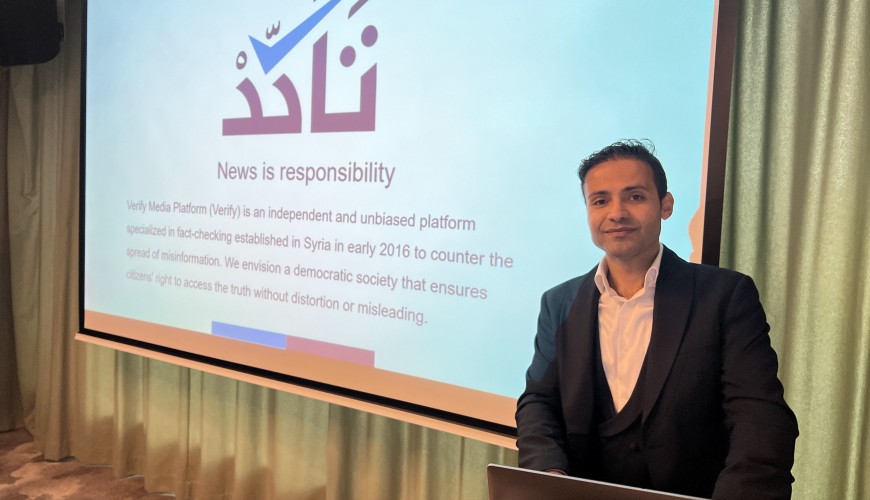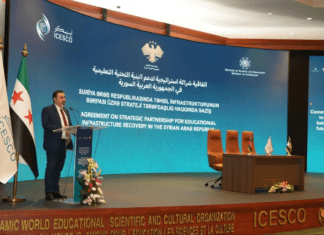
As Syria emerges from over 14 years of conflict and the fall of Bashar al-Assad’s regime, the country finds itself in a fragile state of reconstruction – not just of its physical infrastructure and institutions, but of its fractured society. The Transitional Government (STG) faces monumental challenges in restoring stability, fostering unity, and rebuilding trust among Syrians. Yet amidst these efforts, a flood of false news, politically motivated media narratives, and misinformation campaigns threaten to destabilize the nation further and derail progress.
Disinformation has become a weapon wielded by various actors, both domestic and international, seeking to exploit Syria’s fragile state. According to Ammar al-Shimali, a media analyst with the fact-checking organization Verify-Sy, the collapse of the Assad regime left an “information vacuum” that has been filled with competing narratives designed to incite fear, hatred, and division. This manipulation exacerbates existing tensions, undermines trust in governance, and jeopardizes the STG’s efforts to foster peace.
Weaponizing Fear & Hatred
In Syria’s coastal provinces of Tartous and Latakia, remnants of the former Assad regime, fueled by Iranian incitement, have been implicated in instigating violence and spreading sectarian tensions. False news reports have amplified unrest, including widely circulated claims about attacks on religious shrines. One video depicting the desecration of an Alawite shrine, which sparked protests in Alawite-majority areas, was later debunked as an old recording from Aleppo’s liberation.
“The republishing of such clips is a deliberate attempt to stir up sectarian tensions at a sensitive stage,” warned the STG’s Ministry of Interior. Such misinformation not only risks reigniting intercommunal conflict but also complicates the government’s efforts to bring perpetrators of war crimes to justice.
Similarly, fabricated stories targeting the STG and its international allies have sought to delegitimize Syria’s nascent administration. Last summer, rumors falsely accused revolutionary forces of dismantling electrical infrastructure to surrender regions to the Assad regime. These allegations were debunked by the National Liberation Front (NLF), which attributed the rumors to psychological warfare by Assad loyalists.
The Role of International Actors
Misinformation campaigns are not limited to internal actors. Assad’s staunch allies, Russia and Iran, continue to wield disinformation as a geopolitical tool to maintain influence in Syria. Russia has historically sought to discredit revolutionary groups like the White Helmets, painting them as “unreliable” or “extremists.” Recently, these efforts have intensified to frame the new Syrian leadership as incapable of stabilizing the country.
“The Russian and Iranian information manipulation apparatuses have been operating at full capacity,” said Marcos Sebares Jimenez-Blanco, a fellow at the German Marshall Fund. “They seek to shape the narrative surrounding developments in Syria to compensate for their military and strategic losses.”
Social media platforms have also become battlegrounds for disinformation. Fake human rights pages and mechanized bot accounts have been identified as spreading fear among Syria’s Alawite minority, urging them to resist the transitional government. This deliberate targeting of minorities aims to deepen societal divisions, further destabilizing the country.
Similar tactics have been used to attack the Christian communities in Syria and outside by spreading false news of attacks on Christians, their institutions, and practices, in spite of claims to the contrary by official church representatives and outlets.
Humanitarian & Global Impacts
The consequences of disinformation extend beyond Syria’s borders. Misinformation has the potential to distort international perceptions, reducing critical humanitarian support and jeopardizing foreign investment in reconstruction efforts. “It could shape external perceptions of Syria as a nation incapable of stabilizing itself post-Assad,” Al-Shimali cautioned.
Such narratives have real-world consequences. Disinformation about alleged abuses by the SSG in Idlib, for instance, prompted a wave of international condemnation based on fabricated claims. These allegations were later refuted by fact-checkers and independent journalists, including Wassim Nasr, who observed that the SSG, the Idlib-based precursor to the current caretaker government, actively protects minority rights and fosters social cohesion.
Proceeding with Sincerity & Caution
To combat the dangers of misinformation, Syria’s STG has prioritized transparency and communication. Authorities are working with civil society groups, media organizations, and international partners to establish mechanisms for fact-checking and debunking false narratives. The Ministry of Media has called on Syrians to verify information before sharing it and emphasized the importance of responsible journalism.
“This is a fragile moment for Syria, and for all of us witnessing its unfolding history,” wrote Rana Ali Adeeb, a Concordia University scholar. “Every piece of information carries the potential to shape opinions, influence decisions, and spark actions.” For Syria to rebuild, the STG must not only address its physical and institutional challenges but also foster a society resilient to misinformation.
Rebuilding trust, ensuring accountability, and promoting accurate narratives are essential steps in uniting a fractured nation and securing a stable future. As Syrians strive to overcome the legacy of decades of oppression and misinformation, the battle for truth will remain critical to achieving lasting peace and reconciliation.








